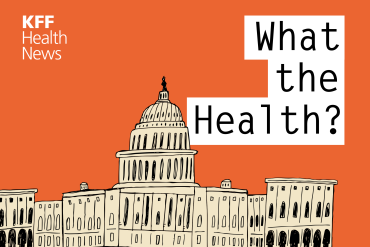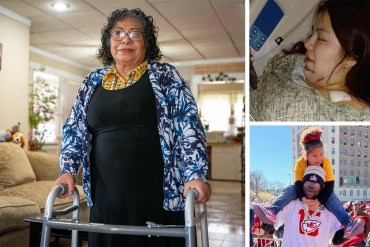Montana Looks To Fast-Track Medicaid Access for Older Applicants
As Montana’s population ages, providers serving low-income seniors say more people aren’t getting the care they need as they wait to get on Medicaid. Montana lawmakers are considering creating a shortcut to that care.
Nursing Aides Plagued by PTSD After ‘Nightmare’ Covid Conditions, With Little Help
A KFF Health News investigation reveals that employers and the government have offered nursing aides little assistance for PTSD and other ongoing maladies triggered by hazardous work during the pandemic.
Watch: What You Reveal, You Heal — Meeting the Makers of ‘Silence in Sikeston’
KFF Health News Midwest correspondent Cara Anthony sat down with WORLD executive producer Chris Hastings to discuss the origins of the “Silence in Sikeston” project, which explores the impact of a 1942 lynching and a 2020 police killing in the same rural Missouri community.
As Interest From Families Wanes, Pediatricians Scale Back on Covid Shots
Pediatricians want to vaccinate kids, but some say they’re keeping their stockpile of covid vaccines low to avoid being stuck with costly, unwanted shots. They can’t afford to stock up on costly shots that parents don’t want.
KFF Health News' 'What the Health?': Let the General Election Commence
Abortion and reproductive health issues headlined the Democratic National Convention in Chicago, as expected. But what Vice President Kamala Harris has in mind for other health policies as the Democratic nominee remains something of a mystery. Meanwhile, former President Donald Trump says he would not use the 19th-century Comstock Act to impose, in effect, a national ban on abortion, which angered his anti-abortion backers. Alice Miranda Ollstein of Politico, Joanne Kenen of Politico and Johns Hopkins University, and Shefali Luthra of The 19th join KFF Health News’ Julie Rovner to discuss these stories and more. Also this week, Rovner interviews KFF Health News’ Tony Leys, who reported and wrote the latest KFF Health News-NPR “Bill of the Month” feature about a woman who fought back after being charged for two surgeries despite undergoing only one.
KFF Health News' 'What the Health?': Happy 50th, ERISA
What does a law to protect worker pensions have to do with how health insurance is regulated? Far more than most people may think. The Employee Retirement Income Security Act, or ERISA, turns 50 in September. The law fundamentally changed the way the federal and state governments regulate employer-provided health insurance and continues to shape health policy in the United States. In this special episode of “What the Health?”, host and KFF Health News chief Washington correspondent Julie Rovner speaks to Larry Levitt of KFF, Paul Fronstin of the Employee Benefit Research Institute, and Ilyse Schuman of the American Benefits Council about the history of ERISA and what its future might hold.
Kids Who Survived Super Bowl Shooting Are Scared, Suffering Panic Attacks and Sleep Problems
Six months after the Feb. 14 parade, parents of survivors under 18 years old say their children are deeply changed. In this installment of “The Injured,” we meet kids who survived the mass shooting only to live with long-term emotional scars.
Since Fall of ‘Roe,’ Self-Managed Abortions Have Increased
The percentage of people who say they’ve tried to end a pregnancy without medical assistance increased after “Roe v. Wade” was overturned. One of the most common reasons for seeking a self-managed abortion was privacy concerns.
KFF Health News' 'What the Health?': Abortion Heats Up Presidential Race
The elevation of Vice President Kamala Harris to the top of the presumed Democratic presidential ticket is newly energizing the debate over abortion, while former President Donald Trump attempts to distance himself from more sweeping proposals in the “Project 2025” GOP blueprint put together by his former administration officials and the conservative Heritage Foundation. Lauren Weber of The Washington Post, Alice Miranda Ollstein of Politico, and Sarah Karlin-Smith of the Pink Sheet join KFF Health News’ Julie Rovner to discuss these stories and more. Also this week, Rovner interviews KFF Health News’ Elisabeth Rosenthal, who reported and wrote the latest KFF Health News-NPR “Bill of the Month” about a preauthorized surgery that generated a six-figure bill.
Louisiana Reclassifies Drugs Used in Abortions as Controlled Dangerous Substances
Louisiana lawmakers have added two drugs commonly used in pregnancy and reproductive health care to the state’s list of controlled dangerous substances, a move that has alarmed doctors in the state.
KFF Health News' 'What the Health?': At GOP Convention, Health Policy Is Mostly MIA
After an assassination attempt last weekend sent former President Donald Trump to the hospital with minor injuries, the Republican National Convention went off with little mention of health care issues. And Trump’s newly nominated vice presidential pick, Sen. J.D. Vance of Ohio, has barely staked out a record on health during his 18 months in office — aside from being strongly opposed to abortion. Alice Miranda Ollstein of Politico, Sarah Karlin-Smith of the Pink Sheet, and Joanne Kenen of Johns Hopkins University and Politico Magazine join KFF Health News’ Julie Rovner to discuss these stories and more. Also this week, Rovner interviews KFF Health News’ Renuka Rayasam, who wrote June’s installment of KFF Health News-NPR “Bill of the Month,” about a patient who walked into what he thought was an urgent care center and walked out with an emergency room bill.
Listen: How the End of ‘Roe’ Is Reshaping the Medical Workforce
In this episode of “The Indicator From Planet Money,” KFF Health News’ chief Washington correspondent, Julie Rovner, reports on how the medical labor force is changing post-Roe v. Wade and why graduating medical students, from OB-GYNs to pediatricians, are avoiding training in states with abortion bans.
Chorus or Cacophony? Cicada Song Hits Some Ears Harder Than Others
Cicadas are the song of the summer, but this year’s large broods may be especially irritating for people on the autism spectrum who have hearing sensitivity.
Experts: US Hospitals Prone to Cyberattacks Like One That Hurt Patient Care at Ascension
Clinicians working for Ascension hospitals in multiple states described harrowing lapses, including delayed or lost lab results, medication errors, and an absence of routine safety checks to prevent potentially fatal mistakes.
End of Pandemic Internet Subsidies Threatens a Health Care Lifeline for Rural America
As the Affordable Connectivity Program runs out of money, millions of people face a jump in internet costs or lost connections if federal lawmakers don’t pass a funding extension.
He Fell Ill on a Cruise. Before He Boarded the Rescue Boat, They Handed Him the Bill.
A man from Michigan was evacuated from a cruise ship after having seizures. First, he drained his bank account to pay his medical bills.
Why One New York Health System Stopped Suing Its Patients
Most U.S. hospitals aggressively pursue patients for unpaid bills. One New York hospital system decided to work with them instead.
Paid Sick Leave Sticks After Many Pandemic Protections Vanish
The U.S. is one of nine countries that do not guarantee paid sick leave. Since the covid pandemic, advocates in states including Missouri, Alaska, and Nebraska are organizing to take the issue to voters with ballot initiatives this November.
Three People Shot at Super Bowl Parade Grapple With Bullets Left in Their Bodies
Despite the rise of gun violence in America, few medical guidelines exist on removing bullets from survivors’ bodies. In the second installment of our series “The Injured,” we meet three people shot at the Kansas City Super Bowl parade who are dealing with the bullets inside them in different ways.
Could Better Inhalers Help Patients, and the Planet?
Puff inhalers can be lifesavers for people with asthma and other respiratory diseases, but some types release potent greenhouse gases that contribute to climate change. That, in turn, worsens wildfires, contributes to air pollution, and intensifies allergy seasons — which can increase the need for inhalers. Some doctors are helping patients switch to more eco-sensitive inhalers.























